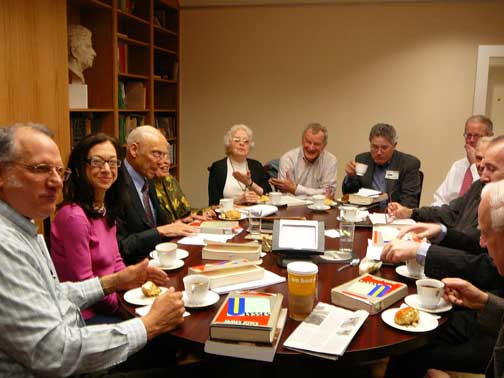


SERVICES
Tuesday June 15, 2010
The "American Friends of James Joyce"
Members of the James Joyce Reading Group By James A. O'Malley P.C. There is nothing unusual about a group of intense, obsessive New Yorkers meeting on the 17th floor of a high rise building on Park Avenue at 8:30 in the morning (make that 8:15 a.m.), until you are told that this is a book club. Yes, welcome to the James Joyce Reading Group, dedicated to the work of the great Irish author. The group consists of approximately 25-35 members - professors, teachers, finance professionals, retirees, actors, and attorneys - who have a deep passion for Joyce. I am one of this motley crew. Once a month, usually third Tuesday of each month, we meet for an hour or 75 minutes to discuss chapter by chapter, or story by story, three books: Dubliners, A Portrait of the Artist as a Young Man and Ulysses. And after we finish them we read these three books again and again, like monks or rabbis poring over holy religious texts to discover new layers of meaning. Why are we so obsessed? James Joyce is a genius of the English language who has captured in his writings the heart of Ireland, the city of Dublin, from its streets, smells, songs, sounds and lilting voices, to its history, politics, nationalism, and dark humor. And as if that were not enough, he throws in the rest of civilization, from Greek mythology to obscure quotations in Latin and Sanskrit. He leaves nothing out and even dares to map out the very consciousness of man. The leader of our reading group, Stanley Goldstein, is a hard taskmaster who scolds latecomers and inspires and encourages us to come up with new interpretations of these great works. In 1995, Stanley, who has built a brilliant career in the financial world, founded the James Joyce Foundation USA, Inc. - known informally as American Friends of James Joyce - originally to raise funds for the James Joyce Centre in Dublin. The organization has grown to include: our unique early morning reading group and another evening group; the James Joyce in High School program, which gives underprivileged high school students the opportunity to take a college level course on Joyce in their local high school; the High School Essay Contest, which awards a $1500 scholarship first prize; and symposiums such as "Joyce and the Italians" and "Joyce and Judaism." "There is nothing more enervating and rewarding as the early morning round table deliberations" of the Joyce reading group, says Irving Heller, a retired teacher. For the last seventeen months, we've been accompanying Leopold Bloom, the protagonist of Ulysses, on his wanderings around Dublin on a single day, June 16, 1904. Read alone, Ulysses can seem impenetrable, even unreadable. As a group, however, we can parse together Joyce's endless references, cross-references and allusions to classical literature, art, philosophy, religion and history, without losing sight that at the heart of the book is a story of love and loss. Joyce masterfully pulls us inside Bloom's consciousness and we experience with him every thought, feeling, sensation and fantasy, even hallucination. But everyone has a different opinion about the kind of man Bloom really is. "Is he a coward? Is he a fool? A real Jew? What exactly is he?" We don't always agree, which makes for lively discussions. The evening group is structured a little differently. Instead of the Socratic method used in our early morning group, Jesse Meyers, who leads the evening group lectures and conducts classes. An adjunct professor at NYU (SCPS), Meyers says, "teaching and lecturing about James Joyce has been one of the great experiences of my life." Although by now an independent scholar of Joyce, Meyers is often surprised by his students' - retirees with extensive life experience - "personal commentaries on passages I had naively thought I previously understood." In the words of one of his students: "reading Joyce is great, but studying and re-reading his works is truly what the joy of literary discovery is about." Our morning group's 18- month cycle of reading Ulysses will end in June. As we start a new cycle reading Dubliners, will some of you Joyce lovers out there join us in our early morning or evening discussions? I hope you will say "yes I will yes." |
CURRENT ISSUE

RECENT ISSUES


SYNDICATE
[What is this?]
POWERED BY

HOSTED BY

Terms of Service | Privacy Policy
Website Design By C3I






